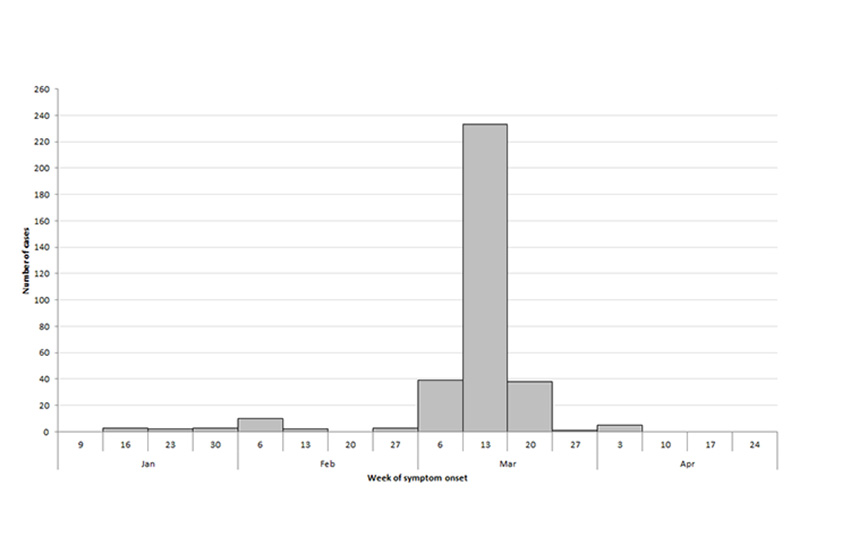Public Health Notice: Outbreak of norovirus and gastrointestinal illnesses linked to raw oysters from British Columbia
April 28, 2022 – Final Update
This notice has been updated to reflect that the outbreak appears to be over and the outbreak investigation has been closed.
On this page
- Why you should take note
- Investigation summary
- Who is most at risk
- What you should do to protect your health
- Symptoms
- What the Government of Canada is doing
- Epidemiological information
- Additional information
- Investigation history
- Media contact
- Public inquiries
Why you should take note
The Public Health Agency of Canada collaborated with federal and provincial public health partners, the United States Centres for Disease Control and Prevention (U.S. CDC), and the U.S. Food and Drug Administration to investigate an outbreak of norovirus and gastrointestinal illnesses involving five provinces: British Columbia, Alberta, Saskatchewan, Manitoba and Ontario. The outbreak appears to be over and the outbreak investigation has been closed.
Investigation findings identified consumption of raw oysters from British Columbia as the source of the outbreak. As a result, some oyster harvesting areas in British Columbia that were associated with the outbreak were closed as a part of the investigation.
The Canadian Food Inspection Agency (CFIA) issued several food recalls throughout February, March, and April. Links to each food recall associated with this investigation can be found at the end of this public health notice.
The outbreak investigation is an important reminder to Canadians and businesses that raw oysters can carry harmful germs that can lead to foodborne illness if not properly handled and cooked prior to consuming.
Investigation Summary
In total, 339 confirmed cases of norovirus and gastrointestinal illness were reported in the following provinces: British Columbia (301), Alberta (3), Saskatchewan (1), Manitoba (15) and Ontario (19). Individuals became sick between mid-January and early April 2022, and no deaths were reported.
Some oyster harvest areas in British Columbia that were associated with illnesses in the outbreak were closed as a part of the investigation. The CFIA issued several food recalls throughout February, March, and April. For more information on the recalled products, please consult the Government of Canada’s Recalls and Safety Alerts website.
The U.S. CDC also investigated a multistate norovirus outbreak linked to raw oysters from British Columbia.
Who is most at risk
Acute gastrointestinal illnesses such as norovirus illness are common in North America and are very contagious, affecting all age groups. However, pregnant women, people with compromised immune systems, young children and the elderly are at risk for developing more serious complications, like dehydration.
What you should do to protect your health
Raw oysters contaminated with noroviruses may look, smell and taste normal. The following safe food-handling practices will reduce your risk of getting sick:
- Do not eat, use, sell, or serve any recalled oysters.
- Avoid eating raw or undercooked oysters. Cook oysters to an internal temperature of 90° Celsius (194° Fahrenheit) for a minimum of 90 seconds before eating.
- Discard any oysters that did not open while cooking.
- Eat oysters right away after cooking and refrigerate leftovers.
- Always keep raw and cooked oysters separate to avoid cross-contamination.
- Do not use the same plate or utensils for raw and cooked shellfish, and wash counters and utensils with soap and warm water after preparation.
- Wash your hands well with soap before and after handling any food. Be sure to clean and sanitize cutting boards, counters, knives and other utensils after preparing raw foods.
Noroviruses can be transmitted by ill individuals and are able to survive relatively high levels of chlorine and varying temperatures. Cleaning and disinfecting practices are the key to preventing further illnesses in your home.
- Thoroughly clean contaminated surfaces, and disinfect using chlorine bleach, especially after an episode of illness.
- After vomiting or diarrhea, immediately remove and wash clothing or linens that may be contaminated with the virus (use hot water and soap).
- If you have been diagnosed with norovirus illness or any other gastrointestinal illness, do not prepare food or pour drinks for other people while you have symptoms, and for the first 48 hours after you recover.
Symptoms
People with norovirus illness usually develop symptoms of gastroenteritis within 24 to 48 hours, but symptoms can start as early as 12 hours after exposure. The illness often begins suddenly. Even after having the illness, you can still become re-infected by norovirus.
The main symptoms of norovirus illness are:
- diarrhea
- vomiting (children usually experience more vomiting than adults)
- nausea
- stomach cramps
Other symptoms may include:
- low-grade fever
- headache
- chills
- muscle aches
- fatigue (a general sense of tiredness)
Most people feel better within one or two days, with symptoms resolving on their own, and experience no long-term health effects. As with any illness causing diarrhea or vomiting, people who are ill should drink plenty of liquids to replace lost body fluids and prevent dehydration. In severe cases, patients may need to be hospitalized and given fluids intravenously. If you have severe symptoms of norovirus, consult your healthcare provider.
What the Government of Canada is doing
The Government of Canada is committed to food safety. The Public Health Agency of Canada leads the human health investigation of an outbreak and is in regular contact with its federal and provincial partners to monitor and take collaborative steps to address outbreaks.
Health Canada provides food-related health risk assessments to determine whether the presence of a certain substance or microorganism poses a health risk to consumers.
The CFIA conducts food safety investigations into the possible food source of an outbreak. CFIA also monitors for biotoxins in shellfish in harvesting areas and is responsible for registering and inspecting fish and shellfish processing plants. The CFIA may recommend that affected sites or areas be opened or closed based on epidemiological information, sample testing results and/or relevant harvest area information.
Fisheries and Oceans Canada is responsible for opening and closing shellfish harvest areas, and enforcing closures under the authority of the Fisheries Act and the Management of Contaminated Fishery Regulations.
Under the Canadian Shellfish Sanitation Program, Environment and Climate Change Canada monitors pollution sources and sanitary conditions in shellfish growing waters.
The Government of Canada will continue to update Canadians as new information related to this investigation becomes available.
Epidemiological information
Figure 1 is an epidemiological curve for this outbreak, which shows the numbers of new cases by week. Outbreak investigators use this information to show when illnesses begin, when they peak, and when they trail off. It can take several weeks from the time a person becomes ill to when the illness is reported and linked to the outbreak. Data are available for 339 cases.
Figure 1: Reported number of cases of norovirus or acute gastrointestinal illness associated with exposures to oysters, by week

Figure 1: Text description
| Week of symptom onset | Number of cases |
|---|---|
| 2022-01-16 | 3 |
| 2022-01-23 | 2 |
| 2022-01-30 | 3 |
| 2022-02-06 | 10 |
| 2022-02-13 | 2 |
| 2022-02-20 | 0 |
| 2022-02-27 | 3 |
| 2022-03-06 | 39 |
| 2022-03-13 | 233 |
| 2022-03-20 | 38 |
| 2022-03-27 | 1 |
| 2022-04-03 | 5 |
| 2022-04-17 | 0 |
| 2022-04-24 | 0 |
Additional information
- Shellfish Food Safety
- VCH News Release (March 18)
- Government of Canada Recalls and Safety Alerts:
- Canadian Shellfish Sanitation Program Manual of Operations
- British Columbia Shellfish Harvesting
- Bivalve Shellfish Sanitary Contamination Closures
- General Food Safety Tips
- U.S. CDC Norovirus outbreak notice
- U.S. FDA Advisory – April 2022
Investigation history
Public Health Notice: April 8, 2022
The Public Health Agency of Canada is collaborating with federal and provincial public health partners, the United States Centres for Disease Control and Prevention (U.S. CDC), and the U.S. Food and Drug Administration to investigate an outbreak of norovirus and gastrointestinal illnesses involving five provinces: British Columbia, Alberta, Saskatchewan, Manitoba and Ontario.
Based on the investigation findings to date, the outbreak is linked to consumption of raw oysters from British Columbia Some oyster harvesting areas in British Columbia that have been associated with illnesses in this outbreak have been closed as a part of the investigation. These closures aim to prevent further illness.
The Canadian Food Inspection Agency (CFIA) has issued several food recalls throughout February, March, and April. Links to each food recall associated with this investigation can be found at the end of this public health notice. The CFIA is continuing its food safety investigation, which may lead to the recall of other products. If other products are recalled, the CFIA will notify the public through updated food recall warnings.
Do not eat, use, sell, or serve the recalled oysters.
Also, avoid eating raw or undercooked oysters to reduce your risk of foodborne illness and follow proper food handling practices. Cook oysters to an internal temperature of 90° Celsius (194° Fahrenheit) for a minimum of 90 seconds.
The outbreak investigation is ongoing and additional actions to protect public health will be taken as needed. This public health notice will be updated as the investigation evolves.
As of April 8, 2022, there have been 328 cases of norovirus and gastrointestinal illness linked to consumption of British Columbia oysters reported in the following provinces: British Columbia (293), Alberta (3), Saskatchewan (1), Manitoba (15) and Ontario (16). Individuals became sick between mid-January and early April 2022, and no deaths have been reported. Although not all cases of illness have been tested, testing of several cases has confirmed the presence of a norovirus infection.
Some oyster harvest areas in British Columbia that have been associated with illnesses in this outbreak have been closed as a part of the investigation. The CFIA has issued several food recalls throughout February, March, and April. For more information on the recalled products, please consult the Government of Canada’s Recalls and Safety Alerts website.
The CFIA is continuing its food safety investigation, which may lead to the recall of other products. If other products are recalled, the CFIA will notify the public through updated food recall warnings.
The U.S. CDC is also investigating a multistate norovirus outbreak linked to raw oysters from British Columbia.
Public Health Notice: March 31, 2022
As of March 30, 2022, there have been 279 cases of norovirus and gastrointestinal illness linked to consumption of B.C. oysters reported in the following provinces: B.C. (262), Alberta (1), Saskatchewan (1), and Ontario (15). Individuals became sick between mid-January and late March 2022, and no deaths have been reported. Although not all cases of illness have been tested, testing of several cases has confirmed the presence of a norovirus infection.
Some oyster harvest areas in B.C. that have been associated with illnesses in this outbreak have been closed as a part of the investigation. Food recalls were conducted on February 18, March 20, March 23, and March 27, 2022 for oysters from B.C. For more information on the recalled products, please consult the Government of Canada’s Recalls and Safety Alerts website.
The CFIA is continuing its food safety investigation, which may lead to the recall of other products. If other products are recalled, the CFIA will notify the public through updated food recall warnings.
Media Contact
Public Health Agency of Canada
Media Relations
613-957-2983
media@hc-sc.gc.ca
Public Inquiries
Call toll-free: 1-866-225-0709
Email: info@hc-sc.gc.ca
